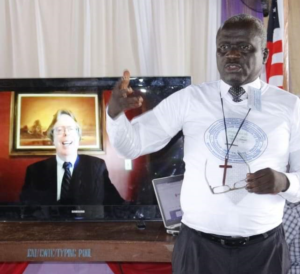Tagged: “Education”
Inaugural Partnership Achievement Award Presented to Tim Markle
Tim Markle, founder and director of Forgiveness Factor, has received a partnership achievement award for his years of commitment to helping others learn about the virtues of self-forgiveness and interpersonal forgiveness.
Markle was recognized with the “Healing Hearts Hero” award by the International Forgiveness Institute (IFI), a 27-year-old not-for-profit organization that has established forgiveness education programs in more than 30 countries around the world. It was presented at the International Educational Conference on Agape Love and Forgiveness in Madison, WI, that was attended by 160 educators from the US, Northern Ireland, Taiwan, Israel, Spain, and the Philippines on July 19-20.

Tim Markle, a forgiveness advocate and founder of Forgiveness Factor, is the first recipient of the IFI’s prestigious “Healing Hearts Hero” award.
For the past 13 years, Markle has been an Outreach Specialist at the University of Wisconsin-Madison Waisman Center where his numerous titles include Director of the Southern Regional Center for Children and Youth with Special Health Care Needs. In those various capacities, Markle works to improve the lives of children and adults with developmental disabilities and neurodegenerative diseases, some of life’s most challenging conditions. He also develops curriculum for a variety of audiences, provides training for both children and adults, and is a prolific speaker.
Markle uses those same management and speaking skills to pursue his secondary passion of “educating people about the benefits of forgiveness”–the passion that earned him the Healing Hearts Hero award. In addition to teaching forgiveness techniques at workshops and conferences throughout the Midwest, Markle has teamed up with Stoughton Health to create a series of popular informational podcasts on the basics of forgiveness (i.e., “Forgiving Yourself” and “The Art of Forgiveness”). He also regularly sends out short written Forgiveness Boosts to his subscribers.
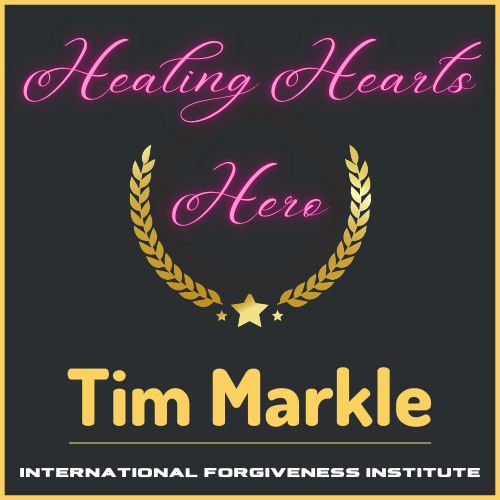 Through radio station Life 102.5FM in Madison, Markle has produced more than 50 short (2-4 minutes each) “Forgiveness Audio Boosts” that the station has been broadcasting since March 2021.
Through radio station Life 102.5FM in Madison, Markle has produced more than 50 short (2-4 minutes each) “Forgiveness Audio Boosts” that the station has been broadcasting since March 2021.
Markle even developed a six-week course that focuses on how to forgive and why forgiveness is indispensable for dealing with anger, depression, anxiety and trauma. The course is based on the ground-breaking scientific forgiveness research work of Dr. Robert Enright, co-founder of the IFI and an educational psychologist at the University of Wisconsin-Madison.
“Tim is a contributing writer for the IFI and the most prolific speaker we have for our Speaker’s Bureau service,” according to Dr. Enright “No one deserves this award more because Tim is not only one of our strongest forgiveness advocates, but he has created his own forgiveness education organization called Forgiveness Factor so he can even better broadcast his faith in forgiveness.”
The Toledo (Ohio) native has a BA degree in Psychology with a minor in Philosophy from Bowling Green State University (BGSU, Bowling Green, Ohio), a Masters in Counseling (MC) from John Carroll University (Cleveland, OH) and a Master of Arts in Christian Studies (MACS) from Trinity Evangelical Divinity School north of Chicago. He and his wife Tracy have two adult children and live in Stoughton, 20 miles east of Madison, WI.
Learn More:
- Visit the Forgiveness Factor
- Watch Markle’s podcasts at Health Talk Podcasts
- Listen to Forgiveness Audio Boosts
- Subscribe to receive Forgiveness Boost emails
- Read Tim Markle’s Bio
Forgiveness Research Goes Viral
Surging world-wide interest in the virtue of forgiveness was vividly demonstrated this week when the International Forgiveness Institute (IFI) released updated distribution totals for its prized Forgiveness Research Tools.
In just the past 17 months, the IFI has fulfilled requests for 717 copies of its Forgiveness Research Tools–requests received from individuals and research organizations in 41 countries and 43 US states plus the District of Columbia. The IFI began offering the tools for free on April 1, 2021.
The forgiveness tools were developed by IFI co-founder![]() Dr. Robert Enright and his associates through the Enright Forgiveness Lab that he established at the University of Wisconsin-Madison. Dr. Enright has validated those scientific measuring tools and used them in more than 50 forgiveness research projects he has conducted at locations around the world since 1993.
Dr. Robert Enright and his associates through the Enright Forgiveness Lab that he established at the University of Wisconsin-Madison. Dr. Enright has validated those scientific measuring tools and used them in more than 50 forgiveness research projects he has conducted at locations around the world since 1993.
By far the most popular and most requested forgiveness tool (223 requests) is the Enright
Self-Forgiveness Inventory (ESFI) that “captures the Aristotelian view of forgiveness as a moral virtue practiced toward the self.” According to Dr. Enright, the tool is based on the premise that “self-forgiveness is a moral virtue, not a psychological technique.”
Close behind in requests (201) is the Enright Forgiveness Inventory-30 (EFI-30)—a shortened version of the Enright Forgiveness Inventory for Adults that has become the interpersonal forgiveness measure tool of choice for research professionals since its development in 1995.
Two other forgiveness tools developed by Dr. Enright are also extremely popular:
- The Enright Forgiveness Inventory for Children—an objective measure of the degree to which one person forgives another who has hurt him or her deeply and unfairly (125 requests); and,
- The Enright Group Forgiveness Inventory—a newly-developed research tool that takes forgiveness from its traditional focus on individuals to a higher magnitude by concentrating on group forgiveness—an area of intervention that has dramatic implications for its ability to enhance peace efforts in the world (109 requests).
Dr. Enright is a licensed psychologist and an educational psychology professor at UW-Madison who pioneered the scientific study of forgiveness. He wrote the first scientific journal article on person-to-person forgiveness, is often introduced as “the father of forgiveness research,” and has been labeled “the forgiveness trailblazer” by Time magazine.
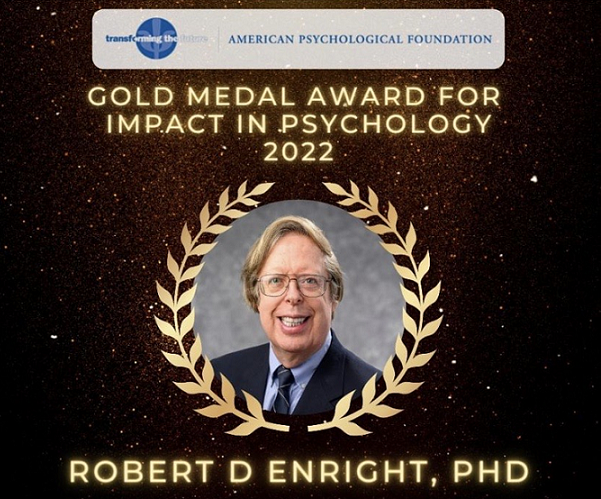 In 2019, Dr. Enright received the international Expanded Reason Award from the Universidad Francisco de Vitoria and the Vatican Foundation Joseph Ratzinger/Benedict XVI and he holds the Aristotelian Professorship in Forgiveness Science (2020) from UW-Madison. Earlier this year he was awarded the 2022 American Psychological Foundation Gold Medal Award for Impact in Psychology. His work integrates psychology, philosophy, and psychotherapeutic disciplines.
In 2019, Dr. Enright received the international Expanded Reason Award from the Universidad Francisco de Vitoria and the Vatican Foundation Joseph Ratzinger/Benedict XVI and he holds the Aristotelian Professorship in Forgiveness Science (2020) from UW-Madison. Earlier this year he was awarded the 2022 American Psychological Foundation Gold Medal Award for Impact in Psychology. His work integrates psychology, philosophy, and psychotherapeutic disciplines.
Dr. Enright’s 37-year quest to harness what he calls “the power of forgiveness” has resulted in the development of curriculum guides for students at each level from pre-kindergarten through 12th grade that are now being used in more than 30 countries around the world.
His groundbreaking clinical manual Forgiveness Therapy,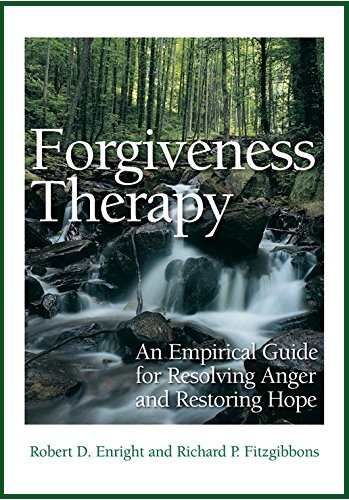 developed with psychiatrist Dr. Richard Fitzgibbons through the American Psychological Association, is the basis for the world’s first online forgiveness education course for psychologists, social workers, nurses, and other professional counselors. It is offered exclusively through the IFI.
developed with psychiatrist Dr. Richard Fitzgibbons through the American Psychological Association, is the basis for the world’s first online forgiveness education course for psychologists, social workers, nurses, and other professional counselors. It is offered exclusively through the IFI.
“When I first began exploring the virtue of forgiveness, I was unable to find a single scientific journal article on forgiveness that had been published anywhere in the world,” Dr. Enright recalls. “Today there are literally hundreds of such articles and based on the demand for our research tools, that number will soon be growing exponentially.”
Dr. Enright’s forgiveness research tools are available free upon request at the International Forgiveness Institute website: internationalforgiveness.com or via email: director@internationalforgiveness.com.
Liberia Seeks Peace Through Forgiveness
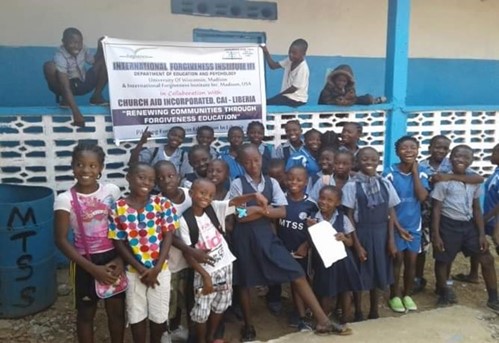
Forgiveness Education class at Mother Tegeste Stewart Apostolic Pentecostal School in Brewerville, Monrovia, Liberia.
Bishop Brown has been working with IFI co-founder Dr. Robert Enright to implement elementary and secondary school Forgiveness Education initiatives (including for all 500 students at the Mother Tegeste Stewart Apostolic Pentecostal School in Brewerville), after-school forgiveness education clubs, and Sunday School forgiveness lessons. Since 2017, Group Forgiveness interventions also have been incorporated into the LFEP thanks to Bishop Brown’s significant role in governmental affairs.
“I suggested that approach, in all humility, because dialogue will not be fruitful if those engaging in the dialogue are still very angry about past grievances,” Dr. Enright explained. “Forgiveness is a scientifically-supported way of eliminating that anger.”
- Can Group Forgiveness In Liberia Lead to Peace?
- A New Strategy for Peace in the World. . . The Enright Forgiveness Inventory
- First Ebola, Now Coronavirus: Liberia Suffers Again
Learn How to Forgive
You can add a methodical, rejuvenating process of forgiveness to your life by attending the upcoming 6-session “Freedom Through Forgiveness” course that begins September 29.
Taught by forgiveness instructor Tim Markle, the in-person course provides the tools and techniques that will enable you to gain a factual understanding of what forgiveness is, what it is not, and how to use it to methodically improve your health and well-being. The interactive sessions are based on the 20-step “Forgiveness Process Model” developed by Dr. Robert Enright, co-founder of the International Forgiveness Institute (IFI) whom Time magazine calls “the forgiveness trailblazer.”
The course is being sponsored by Stoughton Health with classes held at Stoughton Hospital from 6:30-8:00 pm on consecutive Thursday evenings from September 29 through November 10 (with no class on November 3). The facility is located in Stoughton, WI, 17-miles southeast of Madison. There is no charge for the course but enrollment is limited and pre-registration is required. Visit Freedom Through Forgiveness – Stoughton Health for more information or call Stoughton Health at 608-877-3498.
Markle is an Outreach Specialist at the University of Wisconsin-Madison Waisman Center where he works to improve the lives of children and adults with developmental disabilities and neurodegenerative diseases. 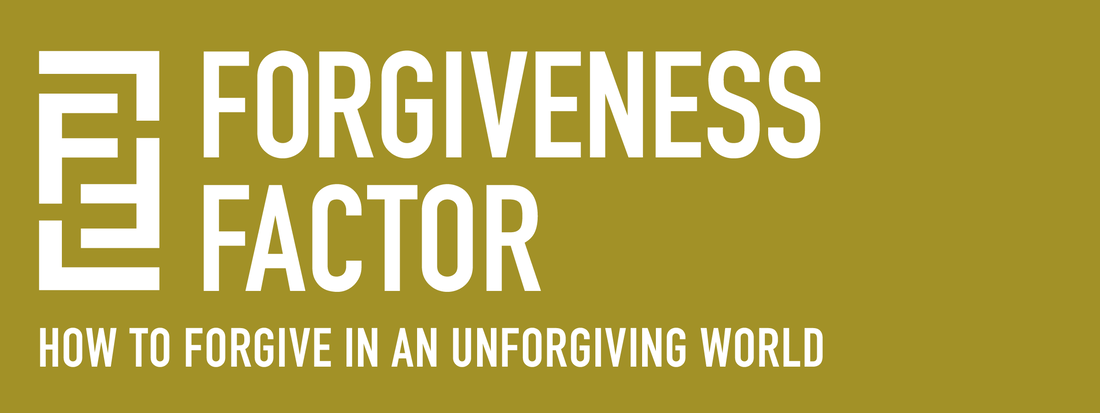 He earned a BA in Psychology from Bowling Green State University, a Masters in Counseling (MC) from John Carroll University, and a Master of Arts in Christian Studies (MACS) from Trinity Evangelical Divinity School. He is a contributing writer and speaker for the IFI and the founder of a forgiveness education organization called Forgiveness Factor.
He earned a BA in Psychology from Bowling Green State University, a Masters in Counseling (MC) from John Carroll University, and a Master of Arts in Christian Studies (MACS) from Trinity Evangelical Divinity School. He is a contributing writer and speaker for the IFI and the founder of a forgiveness education organization called Forgiveness Factor.
Perseverance versus Novelty in Establishing Forgiveness Programs
What is one of the biggest impediments to forgiveness interventions in schools, homes, and organizations?
Having implemented research-based and service programs of forgiveness since about 1990, I can say that one of the most significant challenges is the quest for novelty, for that new, cutting edge activity that fills people with a short-term rush of enthusiasm. When novelty becomes an end in and of itself, it is then that it becomes an impediment to the slow and steady build up of the moral virtue of forgiveness in hearts, homes, and communities. This is the case because the newly popular can extinguish that which has been there for years.
The philosopher Blaise Pascal emphasized that one of the major distractions to growing as persons is what he called diversion. In his book, Pensees, Pascal spends a lot of time discussing this issue of diversion, or being so busy with whatever is preoccupying the person at present that there is no time to contemplate what is important in life.
Consider this quotation from #171 in the Pensees: “The only thing which consoles us for our miseries is diversion, and yet this is the greatest of our miseries. For it is this which principally hinders us from reflecting upon ourselves and which makes us insensibly ruin ourselves. Without this we should be in a state of weariness, and this weariness would spur us to seek a more solid means of escaping from it. But diversion amuses us, and leads us unconsciously to death.”
So, even if a family or an organization or even a community discovers the beauty of forgiveness and implements it, then the challenge is this: How do we keep forgiveness present to us instead of latching on to the newest fad, the newest game, the newest social cause that will fade when the next newest-whatever emerges in about a year or two?
This idea of persevering in forgiveness is vital according to Aristotle, who reminds us that it takes much time and effort to grow in any of the moral virtues. We start with questions about what it even means to forgive. As we work out our misconceptions (it is not excusing or automatically reconciling with someone who is harmful), we then begin to practice forgiveness, applying it to those challenging situations in which we are treated unjustly. This can occur in schools as well. Yet, once the new mathematics textbook appears, or the new anti-bullying approach, or the new field trip guidelines, forgiveness as a part of schooling can quietly fade away, as a rowboat does, from the dock, as the moorings are slowing and imperceptibly loosened from the wooden piling. Forgiveness can slowly drift out to sea without anyone even noticing.
The first step in persevering with forgiveness once it is planted in a group is to realize that it could very easily fade away. This kind of consciousness must not be lost. As a second strategy, we all need to take a lesson from Pascal and know that diversion is not necessarily our friend, especially when it comes to growing courageously in the moral virtues and then persevering in practicing them.
Long live forgiveness, even in the face of the temptation of adding more and more diversion into our lives.
Robert

